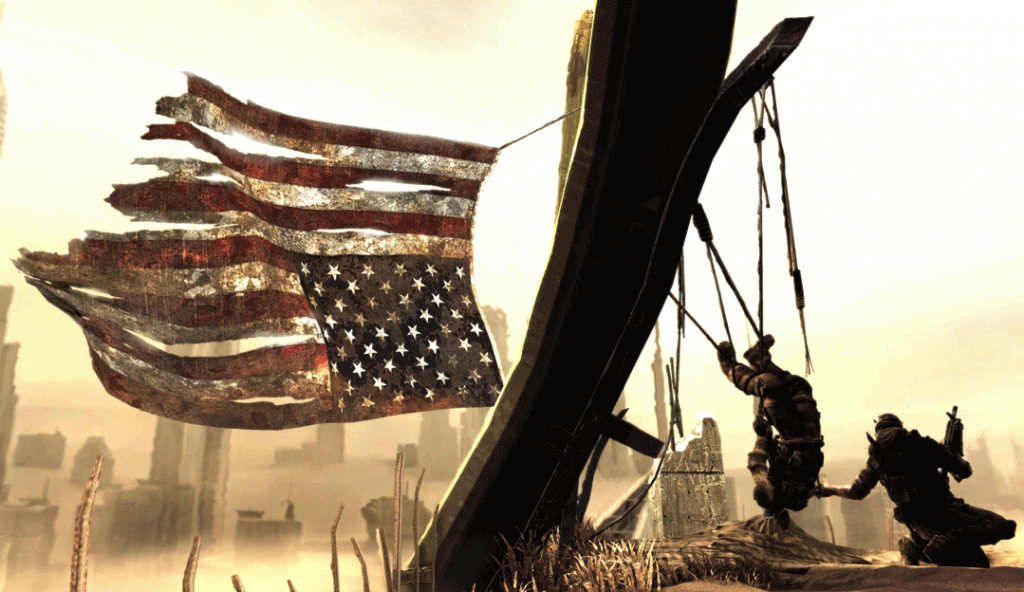Culture
How Gaming Almost Peaks In “Spec Ops: The Line” (Pt. 1)

Welcome to part one of a multi-day feature that will unfold over the next week on Heave, “How Gaming Almost Peaks in Spec Ops: The Line.” Tom Harrison, the newest addition to the Heave staff, will be analyzing the recently released third-person shooter in the title and discussing at length about how it comes frustratingly close to realizing gaming’s potential as a creative medium, only to stop short. Part two will post on Friday.
Also, though given this is a close analysis of a game we shouldn’t have to say this, SPOILERS ahead.
Any pop culture fan with a modicum of critical analysis buzzing about in their brain knows that games are simultaneously one of the best and worst artistic media at work today. When a game really works, when its interactive elements make you feel emotions more strongly than any other art form because they are not the character’s emotions but yours, it’s a fucking exhilarating, unforgettable experience. When a game becomes a tedious slog through bored gameplay tropes that do little to advance the story and frustrate rather than entertain or inspire, it’s unmatchable in awfulness. Spec Ops: The Line (hereafter SO:TL) is a game tailor-made for English majors-cum-amateur game critics like myself, since more than any other game out there it represents the artform’s highest highs and lowest lows. The game teases the player with one of the most emotionally affecting experiences on the market, before jerking them into the harsh reality of a medium not yet sure how to handle its greatest assets, and it’s unbearably, painfully frustrating.
Synopsis time: Prior to the game’s events, Dubai got its shit ruined by a massive sandstorm. A US battalion was trapped inside, along with several thousand civilians. America does what any logical country would do and sends three guys in on foot to help evacuate folks, one of those guaranteed-to-work plans you see the good ol’ gubmint pumping out daily. The leader of the three is Captain Martin Walker, a clean-cut, upstanding Army Dude sternly voiced by Nolan North, because he is a video game protagonist and therefore of course he is.
Turns out the trapped battalion is evil or something, as they assume you are CIA and try to kill you, and brutally control the civilians. Your team pushes forward, helping the CIA (since they’re the only faction that doesn’t try to kill you) and fighting through the rogue battalion to find its leader, killing ludicrous amounts of people along the way. This is not what is important. This series of events is not what the game is about. The game is about Martin Walker, and what happens to a man who spills so much blood for so little reason. With games like Call of Duty having the player cut through hundreds of enemies without a second thought, SO:TL calls you out for what you really are: a murderer.
It almost recalls Othello in its farcical “oh, what will go wrong next!” plotting, and like Othello and unlike most farce, there’s no wacky resolution to be found. (Obligatory shoehorned-in reference to Shakespeare! Yay art and stuff.) When you fuck up an entire enemy encampment with white phosphorus mortars, it’s visceral and satisfying. You feel truly powerful for the first time. Yeah! Take that, dicks! For most games, the scene ends when you feel that triumph. Not so here. You are forced to take a slow, sobering walk through the area you bombarded, as men die around you, screaming as their flesh burns off and they crawl around with missing limbs, and you discover that the consequence of this slaughter is almost exactly the opposite of what you were intending and makes Walker a war criminal! War is fun, right?
Later, your CIA buddies are revealed to be not in the business of rescuing Dubai, but killing it dead once and for all to cover up the military’s shitty job. The last surviving CIA operative ends up pinned under a truck, and you have the option of listening to his request to mercy kill him or let approaching fire give him a much more painful death. Neither option will change the fact that by working with him, you have sentenced every person in Dubai to death. You’re supposed to be the good guy.
This game is a beautiful masterpiece too afraid to show its face. There is enough already present and already working in SO:TL for it to be a monumental achievement that will resound throughout the ages as one of the medium’s best. Still, it would be much easier to accept SO:TL as it is now if the game just missed that greatness, if its ideas were still half-formed and clumsy. Oh well, you’d say, it’s not a great game, but it sure had some interesting ideas! Unfortunately, that’s not the case. It should, by all accounts, be great. To see its brilliance choked out by hours of the genre’s most trite, uninteresting, and goddamn tedious clichés is infuriating. How dare they fuck up something like this?
Love it. Welcome to the staff, Tom!
[…] The following is part two in an ongoing series about recent video game release Spec Ops: The Line, and how/why it comes frustratingly close to perfection, only to fall short. You can read part one over here. […]